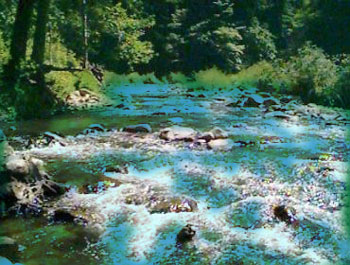
When I was little and little was in my bones, something I could feel and know, something simple and miraculous as stars or fresh dirt, I would stand in the shallows of the San Lorenzo Creek in Santa Cruz and watch the water glide by. It smelled eerie and loud as if long-ago Indians were at the bottom making a ruckus, and the water smelled like shouting. I just knew Indians had something to do with water, the dark cool of it and the smell of it. I wanted as a kid to breathe the water, except I knew I would drown if I did. I sort of wanted to drown, too, though. It might be worth it just to smell the mystery of water. I tried several times to almost touch my nose to the surface and breathe in. It smelled white, the water. Water was life and water was death, and there was only a thread of a line between the two, which you didn’t want to cross, except I wondered what it would be like to be dead. I wondered if angels had wings and if I could then fly and if it would all happen suddenly in a blink and if everything would then be in different colors and if there might be a greater number of colors and tastes and shapes and if I could watch my parents from above and if I could go all invisible and be anywhere or everywhere at once. I was seven then and all alone and thinking about breathing water.
There was a bend in the creek and the water wheeled by dumb and deep, green in the middle, almost black, and clear at the edges where I stood thinking. But it wasn’t dumb at all. It was about the smartest thing I ever saw, because it knew the secret of life and the secret of death; and it wasn’t talking. It had a kind of Indian silence. Which made me want to, quick, dunk my head under and just see about good old death, except then maybe things would go all gray. And I loved the color yellow too much; it seemed a kind of miracle color to me; and I couldn’t take the chance. I also loved how sunlight frickle-frackled all white on the water and how the green wood stairs up to our cabin felt all hot and solid on my bare feet. So, I didn’t want to die. I just wanted to find out what it would be like.
And once, while I stood in the shallows, this orange crayfish came hobbling toward me, like some severed hand trying to walk, this little ugly nightmarish contraption of a thing with eyes and whiskers and claws wobbling along. I didn’t go in the water for a long time after that, and then when I did, I lost one of my flippers, one of my Frankie the Frogman flippers — this blue rubber flipper that, in the inside heel, had a little cartoon picture of a frog in a frogman suit, and the frog was named Frankie and he had a sort of pot belly and frog legs that reminded me of my father whose name was Frankie or Frank and he had a pot belly and frog legs. Except Frankie the Frogman looked forever happy standing there waving, whereas my father was lonely, like a river is lonely, and I knew that in the black-green depths of myself. My father never, ever came with us to the cabin, ever. He might as well have been locked out or thrown away. It was always my grandparents or mother who took us.
So, somewhere in my mind, I had lost my father in the deep, dark San Lorenzo Creek, my actual father. People would say, “No, you didn’t. You lost a stupid little rubber flipper. Don’t be silly.” But I knew they were wrong. I knew my mind was water and there were places below the surface that no one wanted to dunk their heads, where the unspoken truths of things were, maybe like crayfish. I couldn’t sleep then because lying in bed on the screened-in porch with the water smashing over the dam all night long, I pictured my father lying at the bottom of the river, and I had to go save him. I had to get up in the pitch black when everyone was sleeping and feel my way down the green wood stairs and along the sand and into the ice-cold water to save my father, who was at the bottom. I was little, a little boy then, and people thought little was one thing but they were wrong. Little was a thousand things, and only I could save my father.

